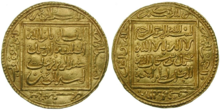Ibn Tumart
|
al-Imam al-Mahdi Muhamed Ibn Tumart |
|
|---|---|

Coin minted during the reign of Abu Yaqub Yusuf, the last line of the inner inscription on the right reads: al-Mahdi Imam al-Umma
|
|
| Title | Imam al-Umma إمام الأمة |
| Born | 1080 Igiliz, Sous, Almoravid empire |
| Died | c. 1128–1130 Tinmel, High Atlas, Almohad Empire |
| Resting place | Tinmel Mosque |
| Ethnicity | Berber |
| Religion | Islam |
| Denomination | Sunni |
| Jurisprudence | Zahiri |
| Creed | Ash'ari |
| Movement | Almohad |
| Disciple of | At-Turtushi |
|
Influenced by
|
|
|
Influenced
|
|
Abu Abd Allah Muhammad Ibn Tumart (Berber: Amghar ibn Tumert, Arabic: أبو عبد الله محمد ابن تومرت, ca. 1080–1130 or 1128), a Muslim Berber religious scholar, teacher and political leader, came from southern Morocco. He founded and served as the spiritual leader of the Almohad movement, a puritanical reform movement launched among the Masmuda Berbers of the Atlas Mountains. Ibn Tumart launched an open revolt against the ruling Almoravids during the 1120s. After his death his followers, the Almohads, went on to conquer much of North Africa and Spain.
Many of the details of Ibn Tumart's life were recorded by hagiographers, whose accounts probably mix legendary elements from the Almohad doctrine of their founding figure and spiritual leader. Ibn Tumart was born sometime between 1078 and 1082 in the small village of Igiliz (exact location uncertain) in the Sous valley of southern Morocco. He was a member of the Hargha, a Berber tribe of the Anti-Atlas range, part of the Masmuda (Berber: imesmuden) tribal confederation.
His name is given alternatively as Muhammad ibn Abdallah or Muhammad ibn Tumart. al-Baydaq reported that "Tumart" was actually his father Abdallah's nickname. ("Tumart" or "Tunart" comes from the Berber language and means "good fortune", "delight" or "happiness", and makes it an equivalent of the Arabic name "Saad". As it was noted by Ahmed Toufiq in his research about Ibn al-Zayyat al-Tadili's famous book "at-Tashawof", many early Sufi saints held this name in Morocco). Ibn Khaldun reports that Muhammad ibn Tumart himself was very pious as a child, and that he was nicknamed Asafu (Berber for "firebrand" or "lover of light") for his habit of lighting candles at mosques.
...
Wikipedia
